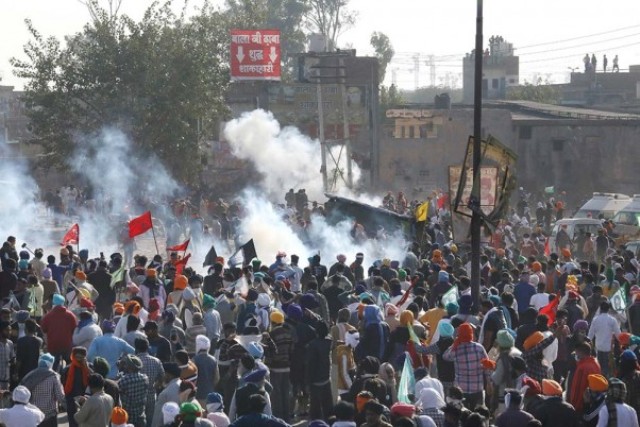
The determination, with which a large number of farmers from different parts of North India are heading towards New Delhi braving water cannons, police highhandedness and clearing hurdles created by security forces and government agencies to thwart their effort to meet rulers of India, clearly shows the farmer’s resolve to fight farm laws.
A large number of farmers have been agitating for the past so many weeks (especially in Punjab) to oppose farm laws enacted by the Modi government allowing farmers to sell their agriculture produce outside APMCs (Agriculture Produce Marketing Committees) in the open market.
The Modi government has been terming the farm laws as “a revolutionary step in the direction of empowering the farmer of India by allowing sale of his produce in the open market outside APMC mandis.”
The Prime Minister of India Narender Modi has been telling farmers, “This measure would make them free to sell their produce at a higher price in the open market – a major step in doubling their income and checking exploitation of arhtiyas.”
On the other hand farmers opposing the farm laws tell, “The farm laws have been enacted to allow entry of big business in the purchase of farm produce to help corporate houses by dismantling APMC mandis and allowing farmer’s exploitation.”
State Secretary of CPM and himself an apple orchardist Dr Onkar Shad says, “The laws would demolish more than 7000 exiting mandis systematically by allowing sale of produce of farmers in the open market without paying market fee as these would not survive without market fees.”
“The demolition of mandis would automatically finish the concept of MSP (minimum support price) announced by the government for various crops, adversely affect food grains procurement system and creation of buffer stocks, very important for implementing Food Security Act and creating food security in the country where lakhs of people go to sleep hungry and millions are dependent for survival on subsidized grains distributed through public distribution system”, he adds.
Dr Shad also narrates the plight of apple growers in Himachal when big players like Adani after buying apples at high prices brought down the purchase price of apple to Rs 40 per kg under the garb of buying quality fruit.
One contentious issue which farmers are strongly opposed to is allowing contract farming to corporate houses and big business which according to them would lead to further exploitation of farmers.
Farmers tell, “By removing 22 items from the Essential Commodities Act’s list black- marketing and hoarding of food grains and vegetables etc would go unchecked leaving both consumer and farmers at the mercy of market manipulators as has been the case in spurt of prices of staple items of Indian kitchens like onions, potatoes and tomatoes for many years.”
Agriculture and Food Expert Dr Devinder Sharma says, “The three farm acts are not in the interest of farmers but to help big corporate houses and large number of farmers throughout the country are determined to oppose these; if the Modi government is really concerned about protecting the interest of farmers it should bring a bill ensuring no farm produce would be sold below the MSP and announce MSP for every farm produce.”
The Kissan Sabha leader Suneet Chopra says , “ No one can mislead the farmers , they understand everything as thousand farmers are committing suicide every year due to crisis in agriculture, how market manipulators force them to destroy their crops as there is no buyer in the market and this government is undermining the strength of the Indian farmer.”
He demands , “ The government should reform APMC Mandis and bring a bill ensuring no farm produce would be sold below MSP and announce MSP for every produce as suggested by Swaminathan Commission – which says MSP has to be determined on the cost of cultivation plus fifty percent profit to the farmers , besides other recommendations made by the Commission.”
Though the Modi government still seems to be assessing the power of the farmer’s agitation but it looks from the determination and resolve of farmers that they are in no mood to relent and reach national capital to oppose the farm bills.
